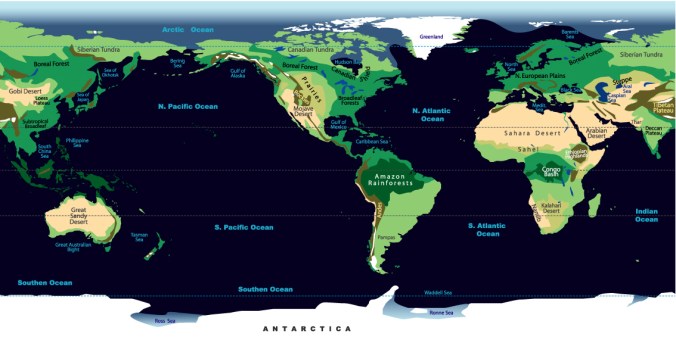
“Despite our many advances, our environment is still threatened by a range of problems including; global climate change, energy dependence on unsustainable fossil fuels, and loss of biodiversity.” – Dan Lipinski
Should humans be concerned with the extinction rate?
If humans are not concerned with terrestrial or aquatic extinction they should be, especially when it comes to the trophic cascade of the African Forest Elephant which is a keystone species in Kenya. Trophic cascade is defined as the “cascading effect that a change in the size of one population at the top of the food web has on the population below it.” (Turk & Bensel, 2014) Because of the rapid decline of the African Forest Elephant due to human-wildlife conflict other r-selected and k-selected species that rely on elephant activity for their survival will also be affected.
African Forest Elephants are a lot like humans whereas they are family orientated, social, self-aware, mourn the loss of family members, and the calf’s are dependent upon their mother’s milk the first few years of their life. Without their mother or families to protect them it would only be a matter of time before the calf would succumb to the elements or from a broken heart. (Bradshaw, 2004) Because African Forest Elephants gestation period is roughly two years, when herds of elephants are killed by poachers for their ivory the chances of extinction increases as maturity levels for reproduction do not occur until around 15 years of age.
Should humans preserve representative samples of all biomes on the planet?
Personally, I am afraid of humans and I do not trust what they may do with the samples if a mass extinction or a mass exodus were to occur on this planet. Humans display a deliberate reckless abandonment towards Earth and its inhabitants and if we drive terrestrial and aquatic biomes to extinction then we should suffer the consequences for those actions.
From an unbiased position, if the samples were entrusted to individuals whose intention was to investigate deeper into scientific methods to help remedy bioaccumulation in oceans for example, than absolutely. In the article “Final Frontier vs Fruitful Frontier” written by Amitai Etzioni, he encourages ocean exploration over human space exploration because space yields zero harvest while cures for diseases are found right here in our oceans. (Etzioni, 2014)
There is still so much to learn about our oceans and planet Earth but humans do not want to look down for answers. Apparently they only look up towards the stars, according to NASA and the DoD. (NASA, 2014)
Reference
Bradshaw, A. (2004). Not by Bread Alone: Symbolic Los, Trauma, and Recovery in Elephant Communities. Society & Animals, 12(2), 143-158. Doi:10.1163/1568530041446535. Retrieved from http://library.ashford.edu/EzProxy.aspx?url=http://search.ebscohost.com.proxy-library.ashford.edu/login.aspx?direct=true&AuthType=ip,cpid&custid=s8856897&db=a9h&AN=13857334&site=ehost-live
Etzioni, A. (2014, June 1) Final Frontier vs. Fruitful Frontier. The Case for Increasing Ocean Exploration. Issues in Science & Technology Vol. 30 Issue 4, p64-74. Retrieved from http://web.b.ebscohost.com.proxy-library.ashford.edu/ehost/pdfviewer/pdfviewer?vid=3&sid=f70bf0f9-3b26-4fcd-bd45-7be832c244c3%40sessionmgr114&hid=127
NASA. (2014, June 3). Beyond Earth: Expanding Human Presence in our Solar System. NASA.Gov. Retrieved from http://www.nasa.gov/exploration/home/index.html
Turk, J., & Bensel, T. (2014). Contemporary environmental issues (2nd ed.). San Diego, CA: Bridgepoint Education, Inc.

One of my key concerns. Very well put.
LikeLiked by 1 person
Thank you!
LikeLike
in the epic Ramayana it is told why plants and animals loved the Hero Rama- they used to blossom on seeing Rama because he would not touch / pluck a single flower or fruit which is not necessary for him at that particular moment.
LikeLiked by 1 person
you may love to read ancient Indian text on environment and ecology.
LikeLiked by 1 person